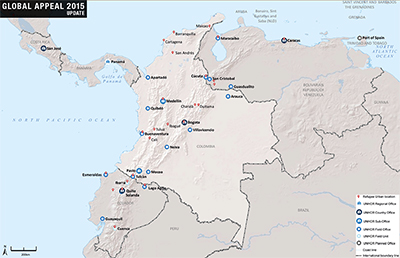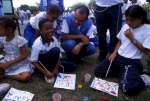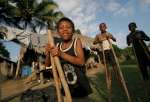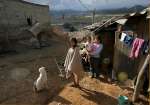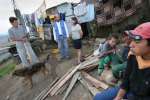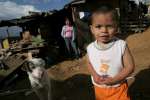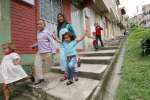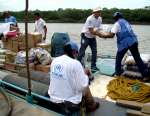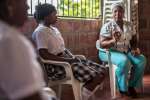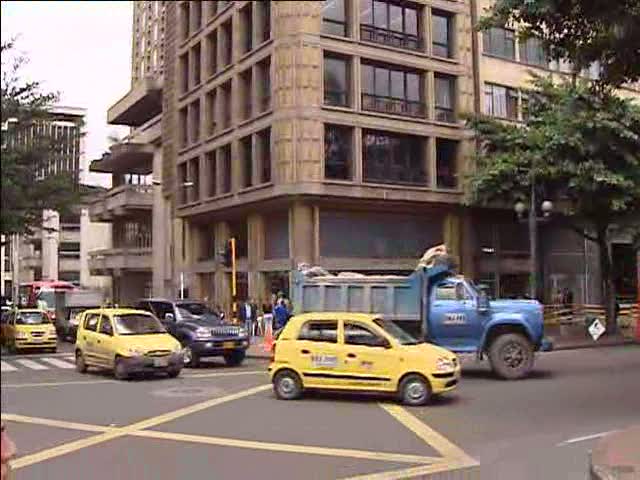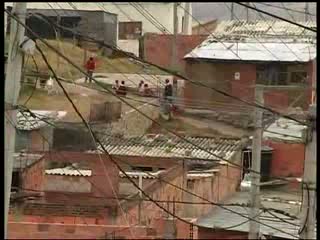Home > Where We Work > Americas > Latin America > Colombia
2015 UNHCR country operations profile - Colombia
| Overview |
Working environment
-
With the re-election of the President in June 2014, peace dialogues with the Revolutionary Armed Forces of Colombia (FARC) and the Army of National Liberation (ELN) continued. By mid-2014, an agreement to give a voice to the victims of conflict was reached. Challenges remain, in particular social and political support for the peace process.
-
Despite government efforts to improve its response to forced displacement and to implement the Law on Victims and Land Restitution (Victims Law), widespread security risks and violence involving the forced recruitment of children and youth, sexual and gender-based violence (SGBV), threats, disappearances and murders, continue to occur. Competition for control of marginalized urban areas has increased.
-
UNHCR is working with authorities and communities to promote sustainable solutions, especially local integration, as more than half of registered internally displaced people (IDPs) reside in cities and are unable or unwilling to return to their communities of origin. The UNHCR-UNDP Transitional Solutions Initiative (TSI) is targeting 17 communities. In this context, the Office will pursue greater focus on solutions-oriented planning and results, and strengthen synergies between protection and solutions work.
-
Despite the allocation of substantive resources by the Government to assist victims of violence and displacement over the past four years, improvements for IDPs remain limited and gaps exist in the implementation of public policy and specific programmes at national and local level.
-
Areas such as Córdoba reported high levels of pressure by armed groups, especially post-demobilization armed groups, in actions affecting land occupation and land restitution processes. Conflict continues in strategically important areas of Colombia, particularly in the coastal and border departments of Arauca, Chocó, Nariño, Norte de Santander, and Putumayo. The Pacific region of the country continues to generate most large-group displacements affecting four departments, with the highest concentration in Cauca followed by Valle del Cauca.
-
The refugee programme will emphasize strengthening access to refugee status determination (RSD) procedures and promoting revision of the legal framework, in light of international protection standards.
People of concern
According to official figures of 30 June 2014, more than 5.7 million people have been internally displaced in Colombia since the start of recording official cumulative registration figures; more than 64,500 people were officially declared displaced during the first half of 2014 and were awaiting registration; and almost 24,000 people were officially registered by the national Victims Unit.
As of 30 June, 237 refugees and 150 asylum-seekers were awaiting a decision of their cases by the Colombian Government. There were also 215 new asylum-seekers. It is expected that in 2015, this number will continue to rise.
With respect to statelessness, the Government is expected to ratify the UN Statelessness Conventions in 2014.
| UNHCR 2015 planning figures for Colombia | |||||
|---|---|---|---|---|---|
| Type of population | Origin | January 2015 | December 2015 | ||
| Total in country | Of whom assisted by UNHCR |
Total in country | Of whom assisted by UNHCR |
||
| Total | 5,740,890 | 425,510 | 5,841,040 | 410,650 | |
| Refugees | Cuba | 70 | 10 | 70 | 10 |
| Nicaragua | 20 | - | 20 | - | |
| Various | 150 | 30 | 140 | 30 | |
| Venezuela (Bolivarian Republic of) | 30 | 20 | 50 | 40 | |
| Asylum-seekers | Cuba | 20 | 20 | 20 | 20 |
| Syrian Arab Rep. | - | - | 10 | 10 | |
| Various | 10 | 10 | 20 | 20 | |
| Venezuela (Bolivarian Republic of) | 20 | 20 | 30 | 30 | |
| Returnee arrivals during year (ex-refugees) | Colombia | 50 | 50 | 100 | 100 |
| Internally displaced | Colombia | 5,740,530 | 425,340 | 5,840,590 | 410,400 |
| Stateless | Stateless | 10 | - | 10 | - |
| Response |
Needs and strategies
The main priorities for IDP operations continue to be prevention, immediate response and life-saving actions and durable solutions; maintaining cross-cutting policies on age, gender and diversity, as well as addressing registry and land issues. Protection remains the focus of the Office and is streamlined in all priorities.
Rights and community-based approaches to protection of communities or groups with special protection needs will be ensured in 2015. To sustain work with communities, protection by presence is required. This strategy will allow the implementation of prevention, protection and solutions-oriented activities and the promotion of civilian state presence to maintain humanitarian space.
Giving visibility to the humanitarian situation and enhancing coordination mechanisms are key UNHCR objectives, both for prevention and protection issues as well as with solutions programmes such as the TSI and alliances with civil society and government actors.
| Implementation |
Coordination
UNHCR will maintain a close working relationship with the Ministry of Foreign Affairs and the Presidential Programme for Social Prosperity through the Special Administrative Units for Victims Assistance, Reparation and Land Restitution, and the National Protection Unit.
The Office has established partnerships with line ministries, in particular the Ministry of Agriculture and Rural Development and the Ministry of the Interior, the Colombian Family Welfare Institute, regional and local administrations and community-based organizations.
Accountability for effective assistance and responses to the plight of IDPs continues to be promoted with the help of the national Office of the Controller.
UNHCR continues to co-lead the protection cluster with the Norwegian Refugee Council (NRC). It is an active member of the UN Country Team and participates in inter-agency coordination. UNHCR and UNDP are working hand-in-hand on TSI, and alliances with the authorities at all levels, as well as with NGOs and other TSI-engaged development actors will be strengthened.
| 2015 UNHCR partners in Colombia |
|---|
| Implementing partners |
| Government agencies: Agency for International Cooperation, Attorney-General's Office, Colombian Institute for Family Welfare, Colombian Rural Development Institute, Colombia's Constitutional Court, Office of the Controller, Department for Social Prosperity, High Presidential Counsellor's Office, Ministry of Agriculture and Rural Development, Ministry of Foreign Affairs, Ministry of Interior, National Protection Unit, Ombudsman's Office, President's Office, Procurator-General's Office, National Civil Registry Office, Special Administrative Unit for Victims' Assistance, Reparation and Land Restitution, Vice-Regional Government and Mayors' offices |
| NGOs: Action contre la Faim, Asociación de Apoyo al Desarrollo Araucano, Consultoría para los Derechos Humanos y el Desplazamiento, Corporación Dios Es Amor, Corporación Infancia y Desarrollo, Corporación Manigua, Corporación Opción Legal, Corporación para la Investigación y el Desarrollo de la Democracia, Corporación Retoños, Fundación un Techo Para Mi País, Fundación Yapawayra, La Organización Nacional Indígena de Colombia, Programa Desarrollo y Paz del Magdalena Medio, Secretariado Nacional de Pastoral Social, Servicio Jesuita a Refugiados, Solidaridad Internacional |
| Operational partners |
| Others: Diakonie, FAO, HelpAge International, ICRC, International Relief and Development, IOM, Lutheran World Federation, Mission to Support the Peace Process in Colombia, MSF, OCHA, OHCHR, Oxfam, Pan American Health Organization / WHO, Peace Brigades International, Plan International, Safe the Children Fund, UN Women, UNDP, UNDSS, UNFPA, UNICEF, UNMAS, UNODC, WFP, Universidad de Los Andes, Universidad Externado de Colombia, Pontificia Universidad Javeriana |
| Financial information |
Over the years, UNHCR's operation in Colombia has received the continuous support of the international community. However, funding in 2012 and 2013 was affected by the global financial situation, causing a decrease in its core budget. The 2015 budget stands at USD 31.6 million.
A funding shortfall would affect UNHCR's overall strategy in Colombia, including critical priorities related to prevention, protection and solutions. The worst affected would be UNHCR's protection-by-presence outreach, community-building processes, and processes that ensure sustainable solutions.
Source: UNHCR Global Appeal 2015 Update
UNHCR contact information
| The UNHCR Representative in Colombia | |||||||||||||||
|---|---|---|---|---|---|---|---|---|---|---|---|---|---|---|---|
| Style of Address | The UNHCR Representative in Colombia | ||||||||||||||
| Street Address | Calle 71 No. 12-55, LocGPSLat : 4.39.25 / LocGPSLong 74.3.39, Bogota, Colombia | ||||||||||||||
| Mailing Address | Calle 113 No. 7-21, Torre A Oficina 601, Bogota, Colombia | ||||||||||||||
| Telephone | 571 546 36 66 | ||||||||||||||
| Facsimile | 571 312 56 11 | ||||||||||||||
| colbo@unhcr.org | |||||||||||||||
| Time Zone | GMT + -5 | ||||||||||||||
| Working Hours |
|
||||||||||||||
| Public Holidays | 01 January 2015, New Year's Day 02 April 2015, Jueves Santo 03 April 2015, Viernes Santo 01 May 2015, Labour Day 20 July 2015, Dia de la independencia 07 August 2015, Battalla de Boyaca 23 September 2015, Aid al Adha 12 October 2015, Dia de la Raza 16 November 2015, Independencia de Cartagena 25 December 2015, Christmas Day |
||||||||||||||
| Head of Office | |
|---|---|
| Style of Address | Head of Office |
| Street Address | Cra.3 No. 7-32 Oficina 1302 Edificio Pacific Trade Cent, Colombia |
| Mailing Address | Colombia |
| Time Zone | GMT + 1 |
| Public Holidays | 01 January 2015, New Year's Day 02 April 2015, Jueves Santo 03 April 2015, Viernes Santo 01 May 2015, Labour Day 20 July 2015, Dia de la independencia 07 August 2015, Battalla de Boyaca 23 September 2015, Aid al Adha 12 October 2015, Dia de la Raza 16 November 2015, Independencia de Cartagena 25 December 2015, Christmas Day |
| Head of Office | |
|---|---|
| Style of Address | Head of Office |
| Street Address | Calle 7 No 39-215 Ofi 1301. Medellin, Colombia, Colombia |
| Mailing Address | Calle 7 No 39-215 Ofi 1301. Medellin, Colombia, Colombia |
| colme@unhcr.org | |
| Time Zone | GMT + 1 |
| Public Holidays | 01 January 2015, New Year's Day 02 April 2015, Jueves Santo 03 April 2015, Viernes Santo 01 May 2015, Labour Day 20 July 2015, Dia de la independencia 07 August 2015, Battalla de Boyaca 23 September 2015, Aid al Adha 12 October 2015, Dia de la Raza 16 November 2015, Independencia de Cartagena 25 December 2015, Christmas Day |
| Head of Office | |
|---|---|
| Style of Address | Head of Office |
| Street Address | Cra 5 No. 10-38 Piso 11, Edificio Cámara De Comercio. N, Colombia |
| Mailing Address | Cra 5 No. 10-38 Piso 11, Edificio Cámara De Comercio. N, Colombia |
| colne@unhcr.org | |
| Time Zone | GMT + 1 |
| Public Holidays | 01 January 2015, New Year's Day 02 April 2015, Jueves Santo 03 April 2015, Viernes Santo 01 May 2015, Labour Day 20 July 2015, Dia de la independencia 07 August 2015, Battalla de Boyaca 23 September 2015, Aid al Adha 12 October 2015, Dia de la Raza 16 November 2015, Independencia de Cartagena 25 December 2015, Christmas Day |
| Head of Office | |
|---|---|
| Style of Address | Head of Office |
| Street Address | Transv. 26 # 41-20 Barrio la Grama. Villavicencio Colom, Colombia |
| Mailing Address | Transv. 26 # 41-20 Barrio la Grama. Villavicencio Colom, Colombia |
| Telephone | 664-5487 |
| Facsimile | 664-5487 |
| colvi@unhcr.org | |
| Time Zone | GMT + 1 |
| Public Holidays | 01 January 2015, New Year's Day 02 April 2015, Jueves Santo 03 April 2015, Viernes Santo 01 May 2015, Labour Day 20 July 2015, Dia de la independencia 07 August 2015, Battalla de Boyaca 23 September 2015, Aid al Adha 12 October 2015, Dia de la Raza 16 November 2015, Independencia de Cartagena 25 December 2015, Christmas Day |
| Head of Sub Office | |||||||||||||||
|---|---|---|---|---|---|---|---|---|---|---|---|---|---|---|---|
| Style of Address | Head of Sub Office | ||||||||||||||
| Street Address | Calle 12 No 20c-108, Barrio El Dorado, San Jose del Guaviare, Colombia | ||||||||||||||
| Mailing Address | Calle 12 No 20c-108, Barrio El Dorado, San Jose del Guaviare, Colombia | ||||||||||||||
| Telephone | 578 5840001 | ||||||||||||||
| Facsimile | 578 5840001 | ||||||||||||||
| colsg@unhcr.org | |||||||||||||||
| Time Zone | GMT + -5 | ||||||||||||||
| Working Hours |
|
||||||||||||||
| Public Holidays | 01 January 2015, New Year's Day 02 April 2015, Jueves Santo 03 April 2015, Viernes Santo 01 May 2015, Labour Day 20 July 2015, Dia de la independencia 07 August 2015, Battalla de Boyaca 23 September 2015, Aid al Adha 12 October 2015, Dia de la Raza 16 November 2015, Independencia de Cartagena 25 December 2015, Christmas Day |
||||||||||||||
| The UNHCR Head of Field Office at Apartado | |||||||||||||||
|---|---|---|---|---|---|---|---|---|---|---|---|---|---|---|---|
| Style of Address | The UNHCR Head of Field Office at Apartado | ||||||||||||||
| Street Address | Calle 100F N° 109-22, Apartado, Colombia | ||||||||||||||
| Mailing Address | Calle 100F N° 109-22, Apartado, Colombia | ||||||||||||||
| Telephone | 57 4 828 7719 | ||||||||||||||
| Facsimile | 57 4 828 7723 | ||||||||||||||
| colap@unhcr.org | |||||||||||||||
| Time Zone | GMT + -5 | ||||||||||||||
| Working Hours |
|
||||||||||||||
| Public Holidays | 01 January 2015, New Year's Day 02 April 2015, Jueves Santo 03 April 2015, Viernes Santo 01 May 2015, Labour Day 20 July 2015, Dia de la independencia 07 August 2015, Battalla de Boyaca 23 September 2015, Aid al Adha 12 October 2015, Dia de la Raza 16 November 2015, Independencia de Cartagena 25 December 2015, Christmas Day |
||||||||||||||
| The UNHCR Head of Field Office at Arauca | |||||||||||||||
|---|---|---|---|---|---|---|---|---|---|---|---|---|---|---|---|
| Style of Address | The UNHCR Head of Field Office at Arauca | ||||||||||||||
| Street Address | Calle 20 Nro 24-68, Barrio las Corocoras, Arauca, Colombia | ||||||||||||||
| Mailing Address | Calle 20 Nro 24-68, Barrio las Corocoras, Arauca, Colombia | ||||||||||||||
| Telephone | 57 7 885 7980 | ||||||||||||||
| Facsimile | 57 7 885 6804 | ||||||||||||||
| colar@unhcr.org | |||||||||||||||
| Time Zone | GMT + -5 | ||||||||||||||
| Working Hours |
|
||||||||||||||
| Public Holidays | 01 January 2015, New Year's Day 02 April 2015, Jueves Santo 03 April 2015, Viernes Santo 01 May 2015, Labour Day 20 July 2015, Dia de la independencia 07 August 2015, Battalla de Boyaca 23 September 2015, Aid al Adha 12 October 2015, Dia de la Raza 16 November 2015, Independencia de Cartagena 25 December 2015, Christmas Day |
||||||||||||||
| The UNHCR Head of Field Office at Cucuta | |||||||||||||||
|---|---|---|---|---|---|---|---|---|---|---|---|---|---|---|---|
| Style of Address | The UNHCR Head of Field Office at Cucuta | ||||||||||||||
| Street Address | Avenida 1a. Nro. 12-35 Centro, Cucuta, Colombia | ||||||||||||||
| Mailing Address | Avenida 1a. Nro. 12-35 Centro, Cucuta, Colombia | ||||||||||||||
| Telephone | 57 7 572 5727 | ||||||||||||||
| Facsimile | 57 7 572 5728 | ||||||||||||||
| colcu@unhcr.org | |||||||||||||||
| Time Zone | GMT + -5 | ||||||||||||||
| Working Hours |
|
||||||||||||||
| Public Holidays | 01 January 2015, New Year's Day 02 April 2015, Jueves Santo 03 April 2015, Viernes Santo 01 May 2015, Labour Day 20 July 2015, Dia de la independencia 07 August 2015, Battalla de Boyaca 23 September 2015, Aid al Adha 12 October 2015, Dia de la Raza 16 November 2015, Independencia de Cartagena 25 December 2015, Christmas Day |
||||||||||||||
| The UNHCR Head of Field Office at Mocoa | |||||||||||||||
|---|---|---|---|---|---|---|---|---|---|---|---|---|---|---|---|
| Style of Address | The UNHCR Head of Field Office at Mocoa | ||||||||||||||
| Street Address | Calle 117 No 07-22, Barrio Villa Diana, Mocoa, Colombia | ||||||||||||||
| Mailing Address | Calle 117 No 07-22, Barrio Villa Diana, Mocoa, Colombia | ||||||||||||||
| Facsimile | 57 8 420 4797 | ||||||||||||||
| colmo@unhcr.org | |||||||||||||||
| Time Zone | GMT + -5 | ||||||||||||||
| Working Hours |
|
||||||||||||||
| Public Holidays | 01 January 2015, New Year's Day 02 April 2015, Jueves Santo 03 April 2015, Viernes Santo 01 May 2015, Labour Day 20 July 2015, Dia de la independencia 07 August 2015, Battalla de Boyaca 23 September 2015, Aid al Adha 12 October 2015, Dia de la Raza 16 November 2015, Independencia de Cartagena 25 December 2015, Christmas Day |
||||||||||||||
| The UNHCR Head of Sub-Office at Barranquilla | |||||||||||||||
|---|---|---|---|---|---|---|---|---|---|---|---|---|---|---|---|
| Style of Address | The UNHCR Head of Sub-Office at Barranquilla | ||||||||||||||
| Street Address | Carrera 54 No 68-196, Piso 9, Barranquilla, Colombia | ||||||||||||||
| Mailing Address | Carrera 54 No 68-196, Piso 9, Barranquilla, Colombia | ||||||||||||||
| Telephone | 57 5 368 1138 | ||||||||||||||
| Facsimile | 57 5 360 0195 | ||||||||||||||
| colbr@unhcr.org | |||||||||||||||
| Time Zone | GMT + -5 | ||||||||||||||
| Working Hours |
|
||||||||||||||
| Public Holidays | 01 January 2015, New Year's Day 02 April 2015, Jueves Santo 03 April 2015, Viernes Santo 01 May 2015, Labour Day 20 July 2015, Dia de la independencia 07 August 2015, Battalla de Boyaca 23 September 2015, Aid al Adha 12 October 2015, Dia de la Raza 16 November 2015, Independencia de Cartagena 25 December 2015, Christmas Day |
||||||||||||||
| The UNHCR Head of Sub-Office at Pasto | |||||||||||||||
|---|---|---|---|---|---|---|---|---|---|---|---|---|---|---|---|
| Style of Address | The UNHCR Head of Sub-Office at Pasto | ||||||||||||||
| Street Address | Carrera 32B No 19-10, Barrio Palermo, Pasto, Colombia | ||||||||||||||
| Mailing Address | Carrera 32B No 19-10, Barrio Palermo, Pasto, Colombia | ||||||||||||||
| Telephone | 57 2 731 3016 | ||||||||||||||
| Facsimile | 57 2 731 3009 | ||||||||||||||
| colps@unhcr.org | |||||||||||||||
| Time Zone | GMT + -5 | ||||||||||||||
| Working Hours |
|
||||||||||||||
| Public Holidays | 01 January 2015, New Year's Day 02 April 2015, Jueves Santo 03 April 2015, Viernes Santo 01 May 2015, Labour Day 20 July 2015, Dia de la independencia 07 August 2015, Battalla de Boyaca 23 September 2015, Aid al Adha 12 October 2015, Dia de la Raza 16 November 2015, Independencia de Cartagena 25 December 2015, Christmas Day |
||||||||||||||

